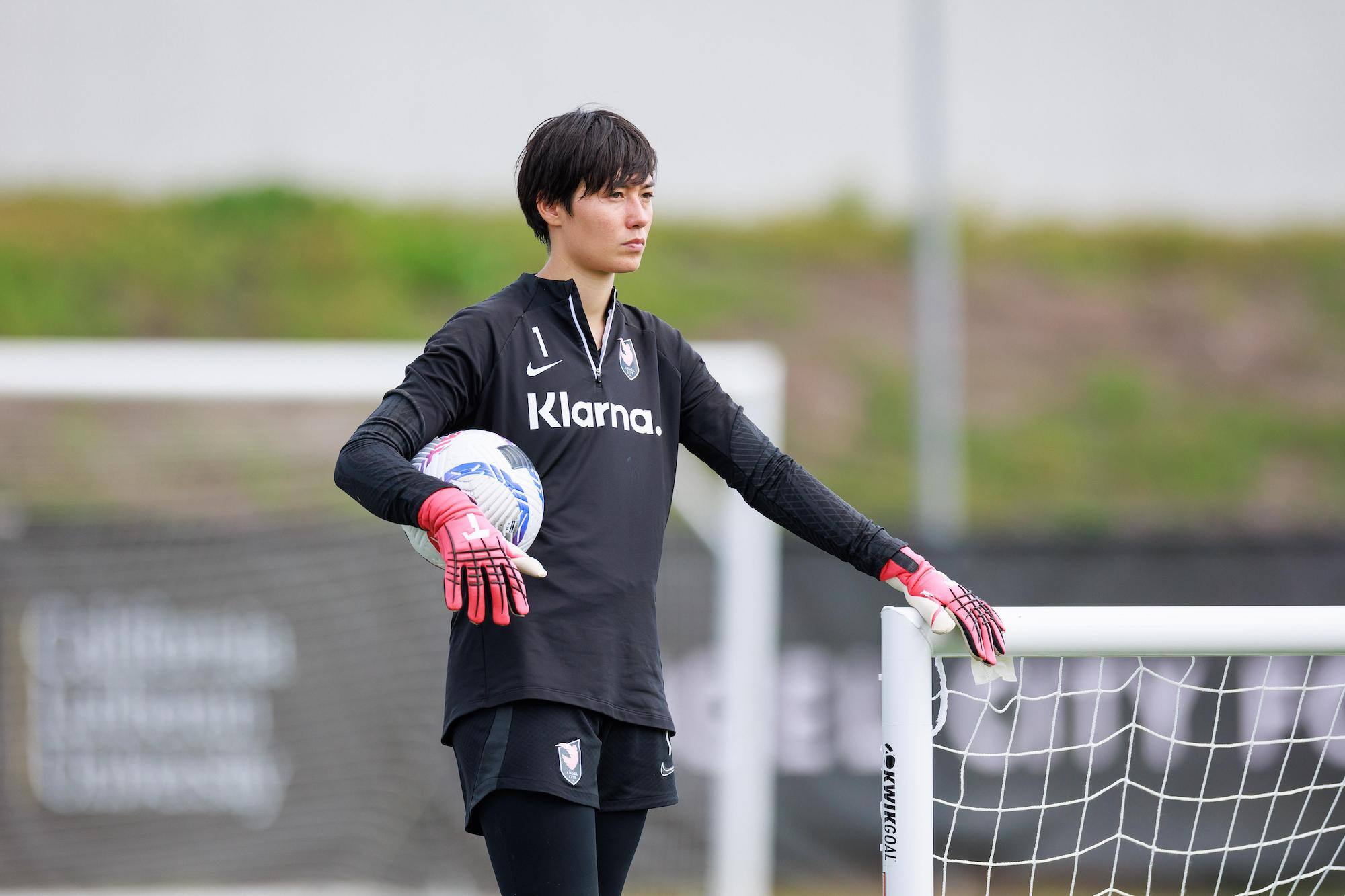
For Hannah Stambaugh, the 25-year-old who signed with Angel City via Japanese club Omiya Ardija Ventus this offseason, the move to LA and to the NWSL hasn’t been easy, but it’s a challenge the goalkeeper has handled with open arms and a good dose of humor.
“It's great having her in the goalkeeping unit because she keeps it really light,” says fellow goalkeeper Angelina Anderson. “Halfway through training, she'll do something or say something that I can't help but, like, bust out laughing. She's so funny.”
Staumbaugh grew up in Fussa, a suburb of Tokyo, with an American father who was in the military (Fussa is home to an American Air Force base) and a Japanese mother. Although growing up near the base meant she had more exposure to American culture than many Japanese while growing up, she’s still experienced culture shock in her move to LA— in both challenging and positive ways. “The culture and environment is completely different from Japan,” she said on Angel City’s media day through translator Saki Watanabe. “Starting from day one, when we did the team-building activities, I was in complete shock.”
At Japanese clubs, she explains, the team environment is much less relaxed than in the US. Players are expected to talk to coaches and teammates in certain ways, to demonstrate their seriousness about the sport. When she got to LA, Stambaugh was surprised at the ACFC staff’s emphasis on helping the team get to know each other as people. “Everyone is super welcoming and nice here,” she says. “From day one, they didn't know me—I don’t even speak much English—but everyone was super nice.”
“At clubs in Japan, it's very unusual to express your opinions,” she continues. “I feel that everyone expressing their opinions and their history and everything makes it a lot easier for people to connect with each other.”
ACFC goalkeeping coach Omar Zeenni says Stambaugh’s big personality has been a great addition to the team. “As a person, she’s kind of a rock star,” he says. “Everybody loved her from the start. Just the way she approaches people and greets them, and her humor is definitely something she leads with. And in the goalkeeping sessions, she’s just somebody who loves to compete.”
Playing abroad has been an aspiration for Stambaugh for a long time. “I wanted to challenge myself in a foreign country,” she says. “At first I was envisioning Europe, but then I really thought about it and thought, since I’m half American, maybe I should play in the US. And while I was thinking that, the offer came through, and I thought, ‘this must be a perfect match.’”
Inspired by her older brother, Tarō, Stambaugh started playing soccer in first grade—which is considered a late start in Japan. She says she initially wanted to be a forward, but because she started later than the other kids—and because she was tall—the coaches put her in goal. She played for her school team until age 12, when she started at the JFA Academy.
It was a difficult move at such a young age. “Moving away from my family, suddenly having to live alone at that age, was the hardest thing,” she remembers. “And the older girls were a bit scary to me.”
She also says she didn’t feel ready from a skill perspective. “The level was really high,” she says. “I was the worst one on the team.”

But she grew through that experience and stayed on the radar for the national team; in 2018, she was named to Japan’s roster for the 2018 U-20 World Cup. She played five out of six games, keeping three clean sheets en route to the team winning the tournament for the first time in its history. She says that victory is her proudest accomplishment in soccer.
“I hadn’t played games in a long time” when the World Cup started, she says. “Even in the qualifying tournament, I was the second-string keeper. But then in the World Cup, they made me the starter and trusted me in goal—and we won!”
Also on that champion U20 team was Angel City forward Jun Endo, who Stambaugh has been friends with since they were teenagers at the JFA academy. “I don’t know if everyone knows this,” she jokes of her perpetually pink-haired teammate, “but Jun’s hair is actually black.”
Stambaugh is still adapting to life in the NWSL. In contrast with Japan, where technicality is emphasized, “the game moves so fast here,” she says. “I want to keep improving as a player, and to do that, I need to learn the American way of thinking and style of soccer.”
Stambaugh says her biggest motivation, both as a player and a person, is a desire to keep learning. “Sometimes I’m so confused [in training]!” she admits. “But it’s okay, because it’s helping me grow.” In Japanese, she says, the kanji for the word taihen—大変, meaning “difficult”—can also be read as “big” and “change.”
“My personality is to work really hard on my passions,” Stambaugh says. “Obviously, I want to keep improving in soccer, but I also want to become fluent in English now that I’m in the US.”
At Angel City, she wears a number—one—that’s traditionally associated with goalkeepers, but for her, it has a deeper meaning. “At first, I was going to choose 87, because of my name,” she says (the Japanese word for “eight” is hachi and “seven” is nana—Ha-na). “But I decided to choose the number one as a guide, to reach my potential.”

